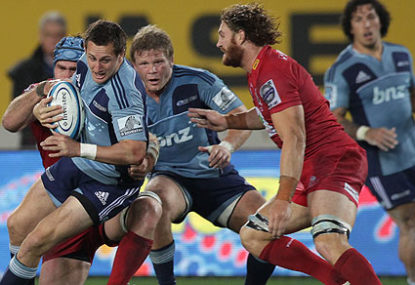Expert

It is that traditional time of year when rugby brains are in danger of overheating as they compute the various permutations of the remaining Super rugby rounds.
But while these frantic calculations can be trying it is worth persisting with them. They have tangible results – the franchise beancounters long for home finals to appease the bank managers while fans (and perhaps even administrators) look to the final standings as a source of pride and ammunition to taunt rivals.
New Waratahs halfback heeds uncle’s words
With that in mind consider the sizeable implications of the following: the possibility of New Zealand having a sole representative in the finals is alive.
Here is how it could work. If the Reds win their last two games at their fortress Suncorp, the Sharks do the same (they are also at home) and the Chiefs trip up the Crusaders and Hurricanes, there is a chance that the top six would be Chiefs, Stormers, Brumbies, Bulls, Reds, Sharks – although not necessarily in that order.
You do not have to have Tolkien’s imagination to know what would come next.
Accusations of “a weak conference” that have been heading westwards from New Zealand all season would soon be returned to sender, with venom, while South Africa would pump out its chest even further. Solemn columns would inquire if this was an indication that the All Blacks were on the slide. One out of six does not make for a good headline.
As a response, New Zealanders might scour the mechanics of the competition to find out the reasons for an outcome of such perceived inequity. But would they have a leg to stand on?
Well, in one word, yes. The key is the wildcard system, which of course does not guarantee two finalists from each conference.
The group that produces the most wins, and competition points, can quite plausibly be the one that supplies the least amount of finalists.
To understand that apparent paradox, take a look at the conferences. The New Zealand teams have collected 41 wins, South Africa 36 and Australia a less flattering 29.
With 16 of their 20 regular-round fixtures complete, New Zealand sides have won 10 trans-Tasman battles against six wins for Australian sides. They are even more successful against the South Africans, with 13 victories and seven losses from their 20 intra-conference matches.
In other words, New Zealand teams have a win rate of 62.5 per cent against Australian teams, and 65 per cent against South Africans – severely undermining the oft-voiced claim in the Republic that they have the strongest conference.
However, South Africa does enjoy a dominant winning percentage against Australia sides, with 13 wins and just five losses in the 18 games so far, equating to a 72 per cent success rate.
So how did we arrive in a situation in which the statistically most powerful conference is uncertain of getting two finalists?
The evidence suggests that not only are the Kiwi sides good at beating overseas sides, they’re adept at beating each other too.
The Highlanders are virtually out of this competition, but they have already beaten the Chiefs, Crusaders and Hurricanes.
Similarly, the Hurricanes have wins against the Highlanders and Crusaders.
Todd Blackadder’s men suffered a headline-grabbing defeat against the Rebels, but it is the three reverses against local foes that have really cost them. If the NZ conference was a single business entity, the level of cannibalisation would be sending the executives straight to the drinks cabinet before lunch.
And it could easily repeat itself next year.
Australia, at present, has no such worries.
More than half of the Brumbies’ total of nine wins have come from their five encounters against the conference’s bottom three sides – the Waratahs, Rebels and Force. The Rebels have now leaked more than 1000 points in less than two full seasons.
In South Africa, imbalance at Super level is part of the landscape, with all the best players scooped up by the big three of the Bulls, Sharks and Stormers. The state of play there is almost guaranteed to set up one of those three powerhouses to have a crack at the title each year.
But let’s take a step back.
While SANZAR meetings conjure up images of the famous denouement in Reservoir Dogs – three men in suits with money on their minds pointing guns at each other – this is the system New Zealand signed up to.
There are benefits of having a highly competitive conference (TV audiences and crowd figures in New Zealand are soaring but down a fraction in Australia) but there is always rough with the smooth.
And if the cards fall in a certain way over the next two weeks, it could get a rough indeed on one side of the Tasman.